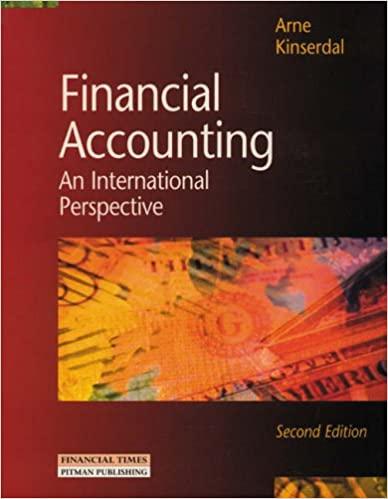Question
Sherrod, Inc., reported pretax accounting income of $76 million for 2016. The following information relates to differences between pretax accounting income and taxable income: a.
| Sherrod, Inc., reported pretax accounting income of $76 million for 2016. The following information relates to differences between pretax accounting income and taxable income: |
| a. | Income from installment sales of properties included in pretax accounting income in 2016 exceeded that reported for tax purposes by $3 million. The installment receivable account at year-end had a balance of $4 million (representing portions of 2015 and 2016 installment sales), expected to be collected equally in 2017 and 2018. |
| b. | Sherrod was assessed a penalty of $2 million by the Environmental Protection Agency for violation of a federal law in 2016. The fine is to be paid in equal amounts in 2016 and 2017. |
| c. | Sherrod rents its operating facilities but owns one asset acquired in 2015 at a cost of $80 million. Depreciation is reported by the straight-line method assuming a four-year useful life. On the tax return, deductions for depreciation will be more than straight-line depreciation the first two years but less than straight-line depreciation the next two years ($ in millions): |
| Income Statement | Tax Return | Difference | |||||||
| 2015 | $ | 20 | $ | 26 | $ | (6 | ) | ||
| 2016 | 20 | 35 | (15 | ) | |||||
| 2017 | 20 | 12 | 8 | ||||||
| 2018 | 20 | 7 | 13 | ||||||
| $ | 80 | $ | 80 | $ | 0 | ||||
| d. | Warranty expense of $3 million is reported in 2016. For tax purposes, the expense is deducted when costs are incurred, $2 million in 2016. At December 31, 2016, the warranty liability was $2 million (after adjusting entries). The balance was $1 million at the end of 2015. |
| e. | In 2016, Sherrod accrued an expense and related liability for estimated paid future absences of $7 million relating to the company's new paid vacation program. Future compensation will be deductible on the tax return when actually paid during the next two years ($4 million in 2017; $3 million in 2018). |
| f. | During 2015, accounting income included an estimated loss of $2 million from having accrued a loss contingency. The loss is paid in 2016 at which time it is tax deductible. |
| Balances in the deferred tax asset and deferred tax liability accounts at January 1, 2016, were $1.2 million and $2.8 million, respectively. The enacted tax rate is 40% each year. |
| Required: |
| 1. | Determine the amounts necessary to record income taxes for 2016 and prepare the appropriate journal entry. (If no entry is required for a transaction/event, select "No journal entry required" in the first account field. Enter your answers in millions rounded to 1 decimal place (i.e., 5,500,000 should be entered as 5.5).) |
| 2. | What is the 2016 net income? (Enter your answer in millions rounded to 1 decimal place (i.e., 5,500,000 should be entered as 5.5).) |
| 3. | Show how any deferred tax amounts should be classified and reported in the 2016 balance sheet. (Enter your answers in millions rounded to 1 decimal place (i.e., 5,500,000 should be entered as 5.5).) |
Step by Step Solution
There are 3 Steps involved in it
Step: 1

Get Instant Access to Expert-Tailored Solutions
See step-by-step solutions with expert insights and AI powered tools for academic success
Step: 2

Step: 3

Ace Your Homework with AI
Get the answers you need in no time with our AI-driven, step-by-step assistance
Get Started


